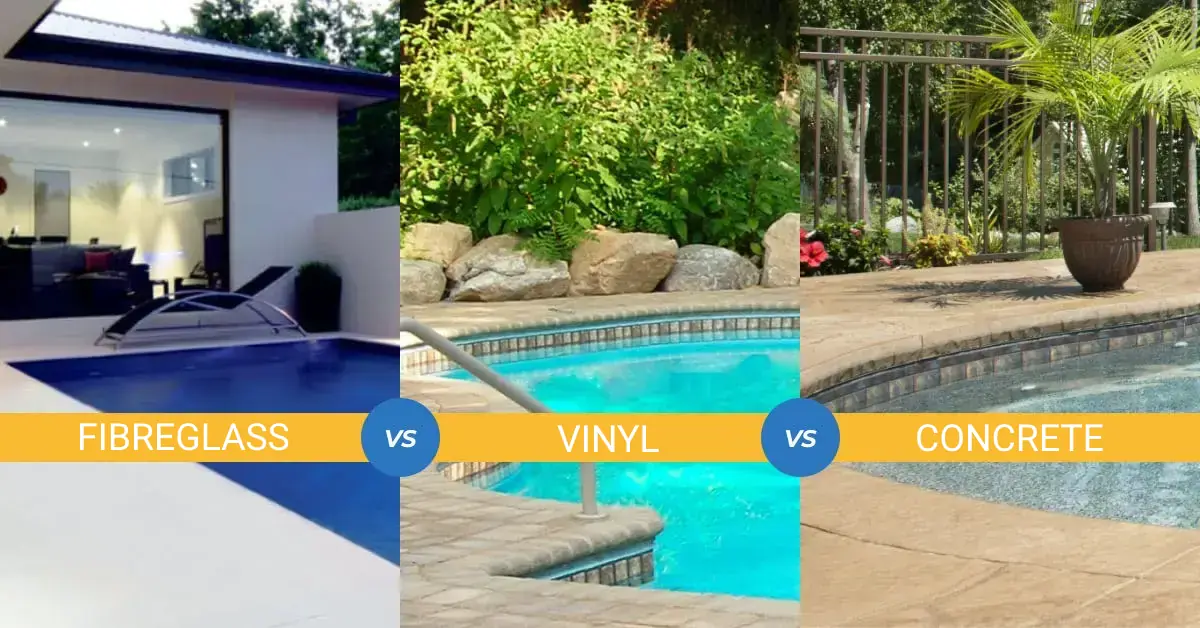
Fibreglass pools vs. vinyl pools vs. concrete pools: The ultimate guide
If you decide on an in-ground pool, you have three options: vinyl liner, fibreglass, and concrete. Each pool type has its advantages and disadvantages. In the following overview, we compare fibreglass and vinyl pools, as well as fibreglass and concrete pools.
As you can see in the table below, fibreglass pools are the best choice in most categories. Read on to find out why.
What you will learn in this guide:
- Advantages of fibreglass pools
- Disadvantages of fibreglass pools
- Advantages of vinyl pools
- Disadvantages of vinyl pools
- Advantages of concrete pools
- Disadvantages of concrete pools
- Comparison: fibreglass vs. vinyl pools
- Comparison: fibreglass vs. concrete pools
Advantages of fibreglass pools
- Durability
Not all fibreglass pools are created equal. The most advanced fibreglass pools are made from Composite Armour™, a patented fibre blend of Dupont™ Kevlar, carbon fibre, and basalt fibre. These fibres provide extreme strength and durability under the harshest conditions. A fibreglass pool like this will last for decades and require minimal maintenance. - Low operating costs
Over a 10-year period, the operating costs of a fibreglass pool are significantly lower than those of a vinyl or concrete pool. Low maintenance costs and long life make fibreglass pools the most cost-effective choice. - Quick installation
A fibreglass pool can be installed in 2 to 3 weeks, while vinyl pools take 5 to 8 weeks and concrete pools take 2 to 4 months. - Compatibility with salt systems
fibreglass pools are resistant to saltwater corrosion, making them the best choice for saltwater systems. In vinyl pools, salt can corrode the steel walls behind the liner, and in concrete pools, salt water increases alkalinity, which shortens the life of the plaster. - Low maintenance
The smooth, non-porous surface of a fibreglass pool prevents the accumulation of dirt and algae, which significantly reduces maintenance. - Long warranty
Fibreglass pools have the best warranties in the industry. Some manufacturers offer a lifetime warranty on their pools, which is made possible by controlled production and high quality.
Disadvantages of fibreglass pools
- Limited shapes and sizes
The biggest limitation of fibreglass pools is the limited selection of shapes and sizes, as the pools depend on pre-made molds. - Higher purchase price compared to vinyl pools
The purchase price of a fibreglass pool is usually $3,000 to $5,000 higher than that of a vinyl pool, but the long-term operating costs are lower.
Advantages of vinyl pools
- Low purchase price
Vinyl pools are usually the most cost-effective way to own an in-ground pool. - Customization options
Vinyl pools offer more customization options in terms of shape and size than fibreglass pools, although they are usually rectangular.
Disadvantages of vinyl pools
- Replacement of the liner
Vinyl pools need a new liner set approximately every 8 to 10 years. The cost of replacing the liner ranges from $5,000 to $7,500. - High maintenance requirements
The chemical balance of the pool water is crucial for vinyl pools. Poor water quality can make the liner brittle and cause wrinkling.
Ambiguous warranty terms
The warranty for vinyl pools is often limited and only covers certain components of the pool.
Advantages of concrete pools
- Complete customization of size and shape
Concrete pools offer the greatest flexibility in design. If you want special shapes or large pools with multiple water areas or a lazy river style, concrete pools are the best choice. - High durability
Concrete pools are robust and resistant to damage, e.g., from pets or large animals.
Disadvantages of concrete pools
- Highest cost
Concrete pools are the most expensive pools in terms of construction and maintenance. They require regular chemical treatment and must be acid washed or re-plastered every 3 to 5 years. - Highest maintenance requirements
Concrete pools require the most maintenance due to their porous surface and algae growth. - Rough surface
- The abrasive surface of a concrete pool can be uncomfortable for swimmers and cause parts of automatic pool cleaners to wear out more quickly.
- Longest installation time
Concrete pools take up to 4 months to build.
Summary: fibreglass pools vs. vinyl pools
- Fibreglass pools: Durable, low maintenance, quick installation, but limited shapes and higher purchase cost.
- Vinyl pools: Low purchase cost and customizable, but requires regular liner replacement and higher maintenance.
Fibreglass vs. concrete pools
- Concrete pools: Customizable and durable, but expensive, high maintenance, and rough.
If you have any further questions, please contact Leisure Pools. One of our professional pool consultants will be happy to talk to you and discuss any questions or concerns you may have.
